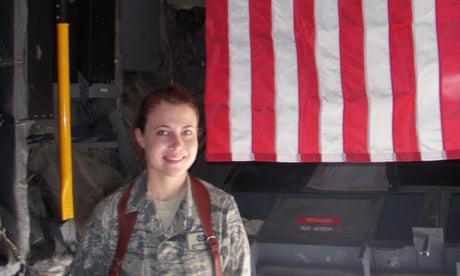- by foxnews
- 01 Feb 2025
Invisible and unheard: how female veterans suffering trauma are let down by US healthcare
Invisible and unheard: how female veterans suffering trauma are let down by US healthcare
- by theguardian
- 29 Dec 2021
- in news

Their experiences in Afghanistan differed from those of the male soldiers with whom they served. Now, their stateside lives do too. Being a woman in war comes with its own set of distinct traumas. While congressional legislation that has recently been proposed is welcome, essential bills are still being blocked that would help repair the suffering these women have endured for years.
Gender differences exist in trauma exposure. PTSD is twice as common in women than in men, according to a study conducted by Kathryn Magruder at the University of South Carolina.
Yet they face additional obstacles when seeking support after their deployment.
The Deborah Sampson Act passed in January of this year made gender-specific services available at veteran medical centers across the country.
However, on 6 December, House and Senate armed service committee leaders tried to block the Military Justice Improvement and Increasing Prevention Act, which would enable veterans to report sexual assault to a neutral third party.
It was December 2010, the year of her first deployment. She was lying in bed at the base at Kandahar, watching American television, when she heard those crashing bumps. Seconds later, the sirens sounded. A rocket had hit. Felicia fell to the floor with a thud and ran for the nearby bunker.
She had arrived in Kandahar energetic and excited. She returned to Minnesota a year later, distant and dejected. The months after coming home were the worst. Gritting her teeth through weekly therapy sessions, she insisted that everything was fine. The therapist believed her, even telling her not to come back.
On 4 January 2012, Felicia tried to kill herself. She began with a single antidepressant. Then she took five more. Then the bottle. None of her co-workers, family or friends knew about her clinical depression. She spent her 22nd birthday in intensive care.
Post-military support at the time, she maintains, was significantly lacking.
The Deborah Samson Act, a bipartisan bill passed by the Senate in January 2021, will establish a policy to end gender-based sexual harassment and assault by training employees and providing legal services for veterans at risk. It will also staff Veteran Affairs facilities with a permanent female health provider.
She was furious and felt unheard.
Looking back, she believes that better healthcare policies for female veterans would have encouraged her to open up about her experiences and struggles sooner. Instead, she dealt with her feelings alone until she needed life-saving help.
She could not, however, turn off the memories of the trauma hospital. As the mother of two young daughters, it tugged at every maternal instinct she had.
The waiting room that November day was bustling with uncles, fathers, cousins and brothers.
Liz had flown to Afghanistan fearless and determined in 2010 but returned to the US four months later, injured and traumatized.
Jen, like Liz, was working in Afghani hospitals because she was a woman. She, too, was haunted by a girl who had lost a foot. But, more, she was haunted by the long-term impacts of sexism and abuse in the military.
Jen was sexually assaulted by her supervisor at a US military base, months before she was deployed to Afghanistan in 2010.
She was made to report it through her chain of command, but was quickly stopped in her tracks. Everyone loved the man she was accusing.
Jen wanted to deploy abroad. She knew no one would believe her. So she stopped, fearing that as a victim, she would be isolated.
But trauma builds on trauma. This experience made Jen more vulnerable to the horrors she witnessed during her service in Afghanistan. Statistically, a history of sexual assault puts a veteran at higher risk for developing PTSD.
Serving at Buckley Space Force Base in Denver, Colorado, when she returned stateside from August 2011 to 2014, things got worse.
Jen started to go through some of the lowest moments of her life.
Her co-workers assumed that she was being emotional about things because she was a woman. Someone she served with in Afghanistan observed that the only PTSD she had was from eating the bad food. This went on for a year and a half.
Jen was assaulted before she arrived in Afghanistan. She worked overtime in the trauma hospital doing mortuary affairs; developed breathing problems; had glass nodules in her lungs. Yet she was perpetually made fun of. It was a very negative culture surrounding her post-deployment.
No one wanted to hear her story.
Currently, the Military Justice Improvement and Increasing Prevention Act is being blocked. If the act had been passed when Jen was on active service, she would have reported her sexual assault.
This is the same for many other women in the military, she believes. And while there is a mountain of legislation being passed to assist female veterans, this is still not enough.
- by travelandtourworld
- descember 09, 2016
Thailand's Luxury Hotels Achieve Exceptional ADR Growth in 2024, Outpacing London and Singapore in Market Gains
Thailand’s luxury hotels saw remarkable ADR growth in 2024, surpassing London and Singapore in percentage increases, highlighting strong market expansion.
read more


